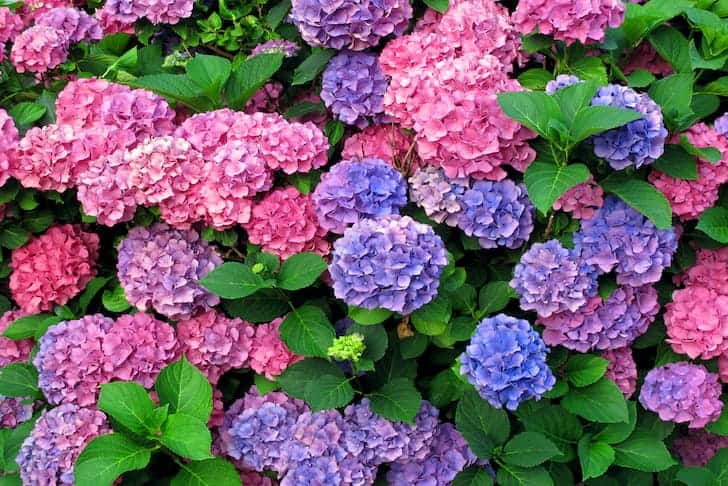Deer are known to eat a variety of plants, including hydrangeas. While the exact reason why deer like to eat hydrangeas is not known, it is believed that the plant’s leaves are high in nutrients that the deer need.
Keeping the Deer Away from 2,000+ Hydrangea Bushes & Fruit Trees
If you’re lucky enough to have deer in your area, you may be wondering if they’ll nibble on your beloved hydrangeas. The good news is that deer generally don’t eat hydrangeas. However, there are a few things to keep in mind.
First, young deer may be more likely to sample a hydrangea bush than an adult. Second, if the plants are stressed due to lack of water or nutrients, they may be more appealing to deer. And finally, if other food sources are scarce, deer may be more likely to munch on just about anything – including hydrangeas.
So if you want to keep your hydrangeas safe from hungry deer, make sure they’re well-watered and fertilized.
Will Hydrangeas Grow Back If Eaten by Deer
It’s a common question asked by gardeners: will hydrangeas grow back if eaten by deer? The answer is yes, they will! Hydrangeas are tough plants and can withstand a lot of abuse.
However, there are a few things to keep in mind if you want them to bounce back quickly.First, make sure to remove all the damaged leaves and stems. This will help the plant focus its energy on regrowing new growth.
Next, give the plant some extra TLC. Water it regularly and apply a light fertilizer. This will give it the boost it needs to start growing again.
Finally, be patient! It may take a few weeks or even months for the plant to fully recover. But with some time and care, your hydrangea will be looking good as new!
Do Deer Eat Azaleas And Hydrangeas
If you’re like most gardeners, you probably have a list of plants that deer love to munch on. And if you live in an area where deer are abundant, you’ve probably lost more than a few plants to these hungry critters. But what about azaleas and hydrangeas?
Do deer eat azaleas and hydrangeas?The answer is yes, deer will eat both azaleas and hydrangeas. In fact, they seem to prefer these plants over many others.
If you have a serious deer problem in your garden, it’s best to avoid planting these two varieties altogether.There are a few things you can do to deter deer from eating your azaleas and hydrangeas, however. First, try spraying the plants with a commercial deer repellent.
You’ll need to reapply this repellent regularly, especially after rains or when new growth appears.Another option is to surround the plants with wire fencing. This won’t necessarily keep the deer out completely, but it will make it more difficult for them to get to the plants.
Just be sure that the fence is tall enough (at least 8 feet) and has small openings (no larger than 1 inch).
How Do You Keep Deer from Eating Hydrangeas
Hydrangeas are a beautiful flowering plant that can add color and life to any garden. However, deer love to eat them! If you live in an area with a lot of deer, you may find your hydrangeas disappearing quickly.
What Plants Do Deer Not Eat
When it comes to choosing plants for your garden, you may be wondering which ones deer will avoid. Deer are known to eat just about anything, but there are some plants they tend to stay away from. Here is a list of plants that deer usually don’t eat:
1. Lavender – This fragrant herb is a favorite among gardeners, and deer typically steer clear of it.
2. Rosemary – Another aromatic herb, rosemary is another good choice if you’re looking to keep deer out of your garden.
3. Sage – Sage is yet another fragrant herb that deters deer. It’s also a great addition to any cook’s kitchen!
4. Thyme – Like the other herbs on this list, thyme has a strong scent that keeps deer at bay. It’s also a versatile cooking ingredient.
5. Peony – Peonies make for beautiful flowers in the springtime, and deer generally leave them alone.
Do Deer Eat Limelight Hydrangeas
According to the North Carolina State University Department of Horticultural Science, deer will eat just about anything when they’re desperate enough for food. However, they generally prefer plants that are high in protein and low in fiber. Limelight hydrangeas (Hydrangea paniculata ‘Limelight’) are not a preferred food source for deer since they’re fairly high in fiber.
The leaves are also somewhat tough and unpalatable. In most cases, deer will only eat limelight hydrangeas if there’s nothing else around that’s more appealing.
What Flowers Do Deer Not Eat
Deer are beautiful creatures that many of us enjoy seeing in our yards and gardens. However, they can also be a nuisance, eating the flowers and plants we’ve worked so hard to grow. If you’re wondering what flowers deer won’t eat, here’s a list of some of the best options:
1. Daffodils (Narcissus) – These spring-blooming bulbs are toxic to deer, so they’ll steer clear.
2. Columbine (Aquilegia) – Another deer-resistant spring flower, columbine has nectar that’s poisonous to them.
3. Lavender (Lavandula) – The strong scent of lavender is off-putting to deer, making it a great choice if you’re looking for something they won’t eat.
4. Marigolds (Tagetes) – The pungent smell of marigolds deters deer as well as other pests like rabbits and slugs.
5. Foxgloves (Digitalis) – All parts of foxgloves are poisonous, so deer avoid them altogether.
Do Deer Eat Lavender
Lavender is a beautiful, fragrant herb that can add a touch of elegance to any garden. But did you know that deer love to eat lavender? If you have deer in your area, they may be nibbling on your lavender plants.
Deer enjoy eating the leaves and flowers of lavender plants. They are especially fond of English lavender (Lavandula angustifolia). If you have a lot of deer traffic in your garden, they may completely strip your lavender plants of all their leaves and flowers.
If you want to keep deer out of your garden, there are a few things you can do. You can try spraying your plants with a commercial deer repellent. Or, you can erect a fence around your garden.
A tall fence will deter most deer from entering.
Do Deer Eat Oakleaf Hydrangeas
Did you know that deer love to eat oakleaf hydrangeas? That’s right, these beautiful plants are a favorite food of deer, and they will munch on them any chance they get. If you’re looking to keep deer out of your garden, then you’ll need to find another way to deter them, as they will surely devour your oakleaf hydrangeas if given the chance.


Which Hydrangea is Most Deer Resistant?
There are many different species of hydrangea, and some are more deer resistant than others. The most deer resistant varieties include the panicle hydrangea (Hydrangea paniculata), the Smooth hydrangea (Hydrangea arborescens), and the Oakleaf hydrangea (Hydrangea quercifolia). Other somewhat deer resistant varieties include the bigleaf hydrangea (Hydrangea macrophylla) and the climbing hydrangea (Hydrangeacliflorum).
Are Deer Attracted to Hydrangeas?
While there are many different types of flowers that deer will eat, they seem to be especially fond of hydrangeas. In fact, deer will often strip a hydrangea bush completely bare in a single feeding. If you’re hoping to keep deer away from your garden, it’s best to avoid planting these beautiful blossoms.
What Eats Hydrangeas?
If you have hydrangeas in your garden, you may be wondering what eats them. The answer may surprise you! There are a variety of animals that enjoy munching on hydrangeas, including deer, rabbits, slugs, and snails.
While these creatures can cause damage to your plants, they are generally not considered to be major pests.Deer are perhaps the most notorious offenders when it comes to eating hydrangeas. If you live in an area with a high deer population, it is likely that your plants will suffer from some browsing damage.
Deer tend to eat the leaves of hydrangeas, which can result in bare stems or stunted growth. In severe cases, deer can completely decimate a planting of hydrangeas.Rabbits also enjoy eating hydrangeas and can cause similar damage as deer.
Slugs and snails are less likely to eat the leaves of your plants but will instead go for the flowers and buds. These creatures usually only cause cosmetic damage and will not kill the plant outright. However, their feeding can make your plants look unsightly.
There are a few things you can do to deter animals from eating your hydrangeas. First, consider installing fencing around the perimeter of your garden. This will help keep out larger animals like deer and rabbits.
You can also try using repellents containing ingredients like hot pepper or garlic oil – just be sure to reapply after rainfall or irrigation. Finally, hand-picking slugs and snails off of your plants is often effective in controlling their populations.
Is Wild Hydrangea Deer Resistant?
Hydrangeas are a beautiful addition to any garden, but if you live in an area with deer, you may be wondering if they’re on the menu. Luckily, wild hydrangeas are actually quite deer resistant. The big leaves and tough stems make them unappealing to most deer, and even if they take a nibble, the plant will usually recover just fine.
So if you’re looking for a way to add some color to your landscape without attracting unwanted visitors, wild hydrangeas should be at the top of your list!
Conclusion
This is a common question that we get asked here at the nursery. The answer is “it depends”. Deer will eat just about anything if they are hungry enough, but there are some plants that they seem to prefer over others.
Hydrangeas are not usually high on their list, but if deer are desperate they will eat them.






